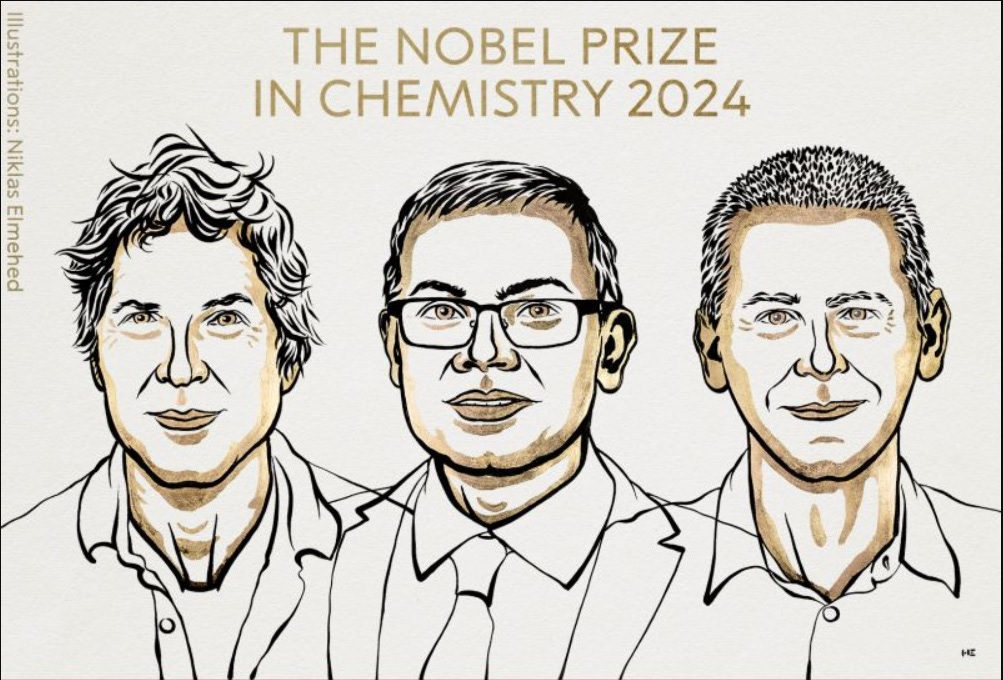Nobel Prize Awarded for AI-Driven Protein Research!
Who are the winners and what do they do? ALSO: 13 Companies To Watch in the AI-driven Protein Design Space
Hi! I am Andrii Buvailo, and this is my weekly newsletter, ‘Where Tech Meets Bio,’ where I talk about technologies, breakthroughs, and great companies moving the biopharma industry forward.
If you've received it, then you either subscribed or someone forwarded it to you. If the latter is the case, subscribe by pressing this button:
Today’s newsletter is sponsored by BiopharmaTrend, your go-to resource for news, trends, and analysis of the cutting-edge advances in pharma, biotech and healthcare.
Check out BiopharmaTrend media kit and secure sponsored content marketing/storytelling campaigns in Q4 2024-2025!
Now, let’s get to this week’s topic!
The 2024 Nobel Prize in Chemistry has just been awarded to David Baker, Demis Hassabis, and John Jumper for their pioneering work in protein science, focusing on computational protein design and protein structure prediction.
So, who are they and what do they do?
David Baker (to the left in the image) is a biochemist and professor at the University of Washington, known for his pioneering work in the field of computational protein design.
He leads the Institute for Protein Design, where he has developed innovative tools like the Rosetta software suite, which enables scientists to predict protein structures and design new proteins from scratch.
The Rosetta platform uses advanced algorithms to simulate protein folding based on amino acid sequences, allowing researchers to model the three-dimensional shapes of proteins with high accuracy. This capability is crucial for designing proteins with specific functions, such as novel enzymes, therapeutic proteins, or molecular scaffolds used in immunotherapy.
Baker’s work extends beyond academic research; he has co-founded several biotech companies, including A-Alpha Bio and Neoleukin Therapeutics, which leverage computational protein design for drug discovery and synthetic biology applications.
At Neoleukin Therapeutics, for example, the company focused on developing de novo designed proteins that mimic the function of natural cytokines to modulate immune responses for cancer therapy. His research has also enabled the development of synthetic proteins that can neutralize viruses, bind to cancer cells, or improve vaccine formulations.
In December 2023, Neoleukin merged with Neurogene, a company specializing in gene therapy for rare neurological conditions, in a reverse merger valued at approximately $120 million. As part of the agreement, Neurogene became a wholly owned subsidiary of Neoleukin, but the combined company adopted the Neurogene name and shifted its focus toward Neurogene's pipeline of genetic therapies
The Rosetta software, which is now used globally, has applications ranging from enzyme engineering to the design of small molecule drugs, with the platform being integrated into services offered by companies such as Schrödinger and Cyrus Biotechnology.
Demis Hassabis (in the center) and John Jumper (to the right) are key figures in artificial intelligence and computational biology, best known for their work at DeepMind, a subsidiary of Alphabet (Google's parent company).
Demis Hassabis is the co-founder and CEO of DeepMind, with a background in neuroscience and computer science. He was also a chess prodigy when he was a child. He has been instrumental in leading DeepMind’s efforts to apply AI to solve complex scientific problems including protein folding.
John Jumper, a research scientist at DeepMind, played a crucial role in developing the AI-based model AlphaFold, which achieved a breakthrough in protein structure prediction.
The duo's achievement with AlphaFold addressed a long-standing challenge known as the "protein folding problem," a key question in biology that had persisted for over 50 years. The problem centers around predicting the three-dimensional structure of a protein solely from its amino acid sequence.
Understanding a protein's structure is essential for grasping its function and designing drugs that can target or modify it effectively. AlphaFold utilized a deep learning approach to predict protein structures with remarkable accuracy, revolutionizing the field of structural biology.
The development of AlphaFold involved training an AI model on a massive dataset of known protein structures. The AI system learned patterns in the data and was able to generalize these patterns to predict the structures of proteins for which no experimental data existed.
In 2020, AlphaFold achieved a milestone by surpassing traditional methods in a biennial competition called Critical Assessment of Structure Prediction (CASP), where it outperformed other approaches in predicting protein structures.
The impact of AlphaFold extends beyond academic research; it has democratized access to protein structures by making its predictions freely available through the AlphaFold Protein Structure Database, which now contains predicted structures for over 200 million proteins.
Surprisingly enough, this year’s Nobel Prize award in Chemistry marks the second AI-related Nobel Prize in 2024!
Indeed, the 2024 Nobel Prize in Physics went to John Hopfield and Geoffrey Hinton for their pioneering work on artificial neural networks.
Hopfield developed the Hopfield network, which uses physics principles to store and reconstruct data patterns, while Hinton created the Boltzmann machine, a network applying statistical physics to recognize data features.
Their work laid the foundation for modern machine learning and deep learning technologies, enabling advancements in AI applications like image recognition and language processing.
Basically, you can thank those two guys for all the AI-generated content we now see on the internet… (jk).
13 Companies To Watch in the AI-driven Protein Design Space
While this year’s Nobel Prize recognizes the foundational aspects of AI-driven protein design, there is a growing number of companies in this increasingly crowded space.
You can read some of the previous newsletters about AI-driven protein design companies, including:
Absci and Other AI-Powered Biotechs Lead the Way in Antibody Discovery
But today I would like to highlight 13 cutting edge companies to watch this year in the AI-driven protein design space, including various protein modalities.



